Management Report
VerifiedAdded on 2023/01/18
|8
|2221
|48
AI Summary
Contribute Materials
Your contribution can guide someone’s learning journey. Share your
documents today.
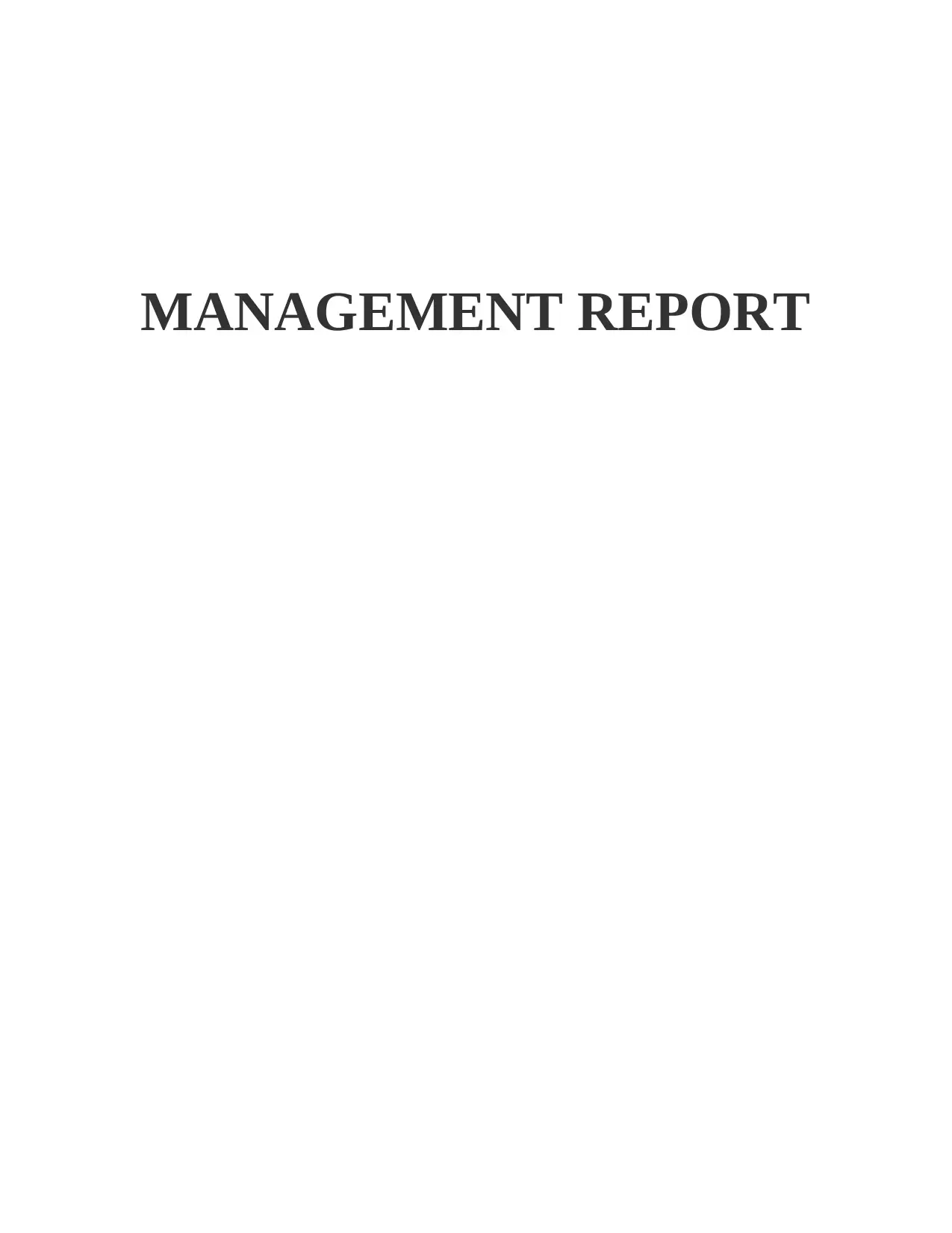
MANAGEMENT REPORT
Secure Best Marks with AI Grader
Need help grading? Try our AI Grader for instant feedback on your assignments.
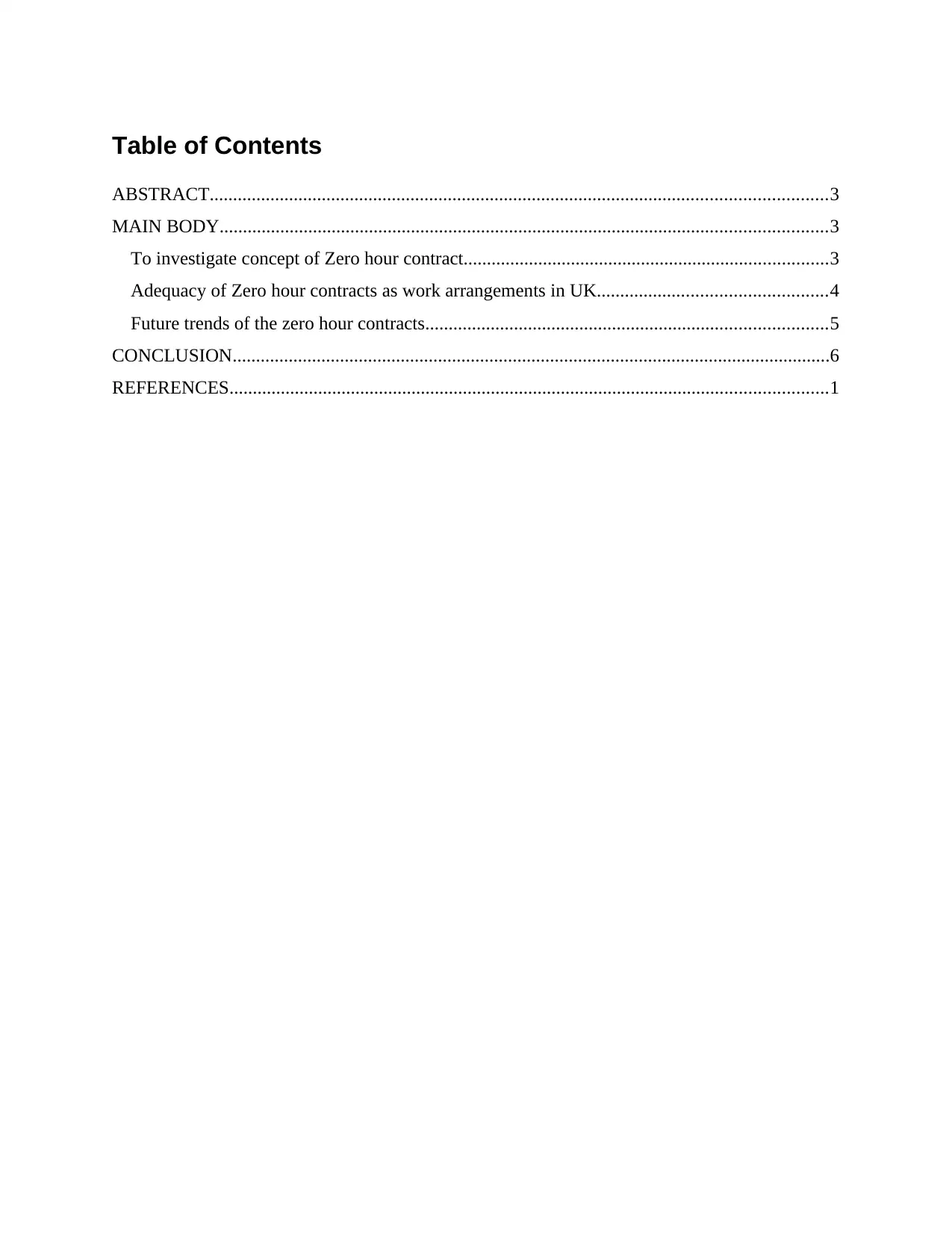
Table of Contents
ABSTRACT....................................................................................................................................3
MAIN BODY..................................................................................................................................3
To investigate concept of Zero hour contract..............................................................................3
Adequacy of Zero hour contracts as work arrangements in UK.................................................4
Future trends of the zero hour contracts......................................................................................5
CONCLUSION................................................................................................................................6
REFERENCES................................................................................................................................1
ABSTRACT....................................................................................................................................3
MAIN BODY..................................................................................................................................3
To investigate concept of Zero hour contract..............................................................................3
Adequacy of Zero hour contracts as work arrangements in UK.................................................4
Future trends of the zero hour contracts......................................................................................5
CONCLUSION................................................................................................................................6
REFERENCES................................................................................................................................1
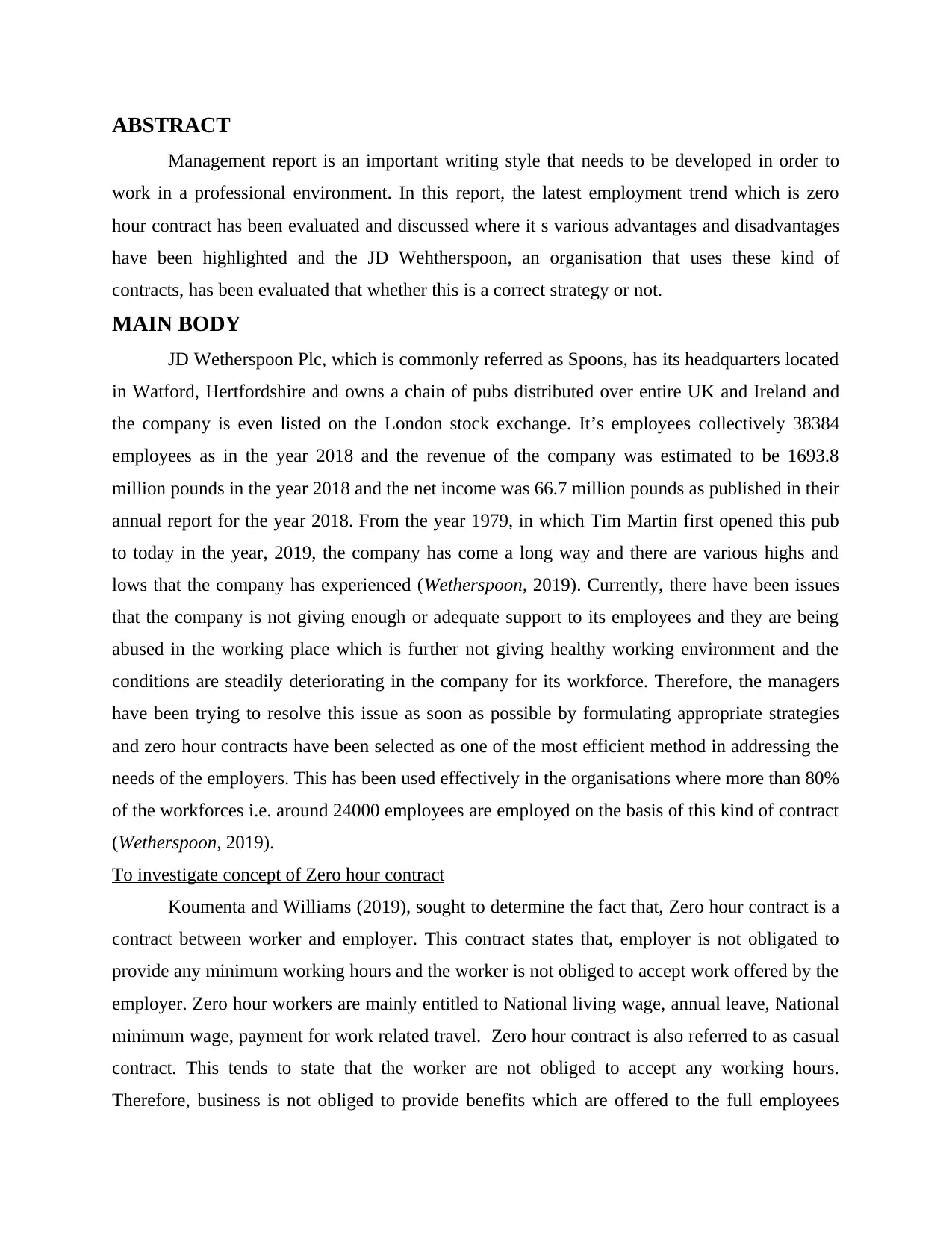
ABSTRACT
Management report is an important writing style that needs to be developed in order to
work in a professional environment. In this report, the latest employment trend which is zero
hour contract has been evaluated and discussed where it s various advantages and disadvantages
have been highlighted and the JD Wehtherspoon, an organisation that uses these kind of
contracts, has been evaluated that whether this is a correct strategy or not.
MAIN BODY
JD Wetherspoon Plc, which is commonly referred as Spoons, has its headquarters located
in Watford, Hertfordshire and owns a chain of pubs distributed over entire UK and Ireland and
the company is even listed on the London stock exchange. It’s employees collectively 38384
employees as in the year 2018 and the revenue of the company was estimated to be 1693.8
million pounds in the year 2018 and the net income was 66.7 million pounds as published in their
annual report for the year 2018. From the year 1979, in which Tim Martin first opened this pub
to today in the year, 2019, the company has come a long way and there are various highs and
lows that the company has experienced (Wetherspoon, 2019). Currently, there have been issues
that the company is not giving enough or adequate support to its employees and they are being
abused in the working place which is further not giving healthy working environment and the
conditions are steadily deteriorating in the company for its workforce. Therefore, the managers
have been trying to resolve this issue as soon as possible by formulating appropriate strategies
and zero hour contracts have been selected as one of the most efficient method in addressing the
needs of the employers. This has been used effectively in the organisations where more than 80%
of the workforces i.e. around 24000 employees are employed on the basis of this kind of contract
(Wetherspoon, 2019).
To investigate concept of Zero hour contract
Koumenta and Williams (2019), sought to determine the fact that, Zero hour contract is a
contract between worker and employer. This contract states that, employer is not obligated to
provide any minimum working hours and the worker is not obliged to accept work offered by the
employer. Zero hour workers are mainly entitled to National living wage, annual leave, National
minimum wage, payment for work related travel. Zero hour contract is also referred to as casual
contract. This tends to state that the worker are not obliged to accept any working hours.
Therefore, business is not obliged to provide benefits which are offered to the full employees
Management report is an important writing style that needs to be developed in order to
work in a professional environment. In this report, the latest employment trend which is zero
hour contract has been evaluated and discussed where it s various advantages and disadvantages
have been highlighted and the JD Wehtherspoon, an organisation that uses these kind of
contracts, has been evaluated that whether this is a correct strategy or not.
MAIN BODY
JD Wetherspoon Plc, which is commonly referred as Spoons, has its headquarters located
in Watford, Hertfordshire and owns a chain of pubs distributed over entire UK and Ireland and
the company is even listed on the London stock exchange. It’s employees collectively 38384
employees as in the year 2018 and the revenue of the company was estimated to be 1693.8
million pounds in the year 2018 and the net income was 66.7 million pounds as published in their
annual report for the year 2018. From the year 1979, in which Tim Martin first opened this pub
to today in the year, 2019, the company has come a long way and there are various highs and
lows that the company has experienced (Wetherspoon, 2019). Currently, there have been issues
that the company is not giving enough or adequate support to its employees and they are being
abused in the working place which is further not giving healthy working environment and the
conditions are steadily deteriorating in the company for its workforce. Therefore, the managers
have been trying to resolve this issue as soon as possible by formulating appropriate strategies
and zero hour contracts have been selected as one of the most efficient method in addressing the
needs of the employers. This has been used effectively in the organisations where more than 80%
of the workforces i.e. around 24000 employees are employed on the basis of this kind of contract
(Wetherspoon, 2019).
To investigate concept of Zero hour contract
Koumenta and Williams (2019), sought to determine the fact that, Zero hour contract is a
contract between worker and employer. This contract states that, employer is not obligated to
provide any minimum working hours and the worker is not obliged to accept work offered by the
employer. Zero hour workers are mainly entitled to National living wage, annual leave, National
minimum wage, payment for work related travel. Zero hour contract is also referred to as casual
contract. This tends to state that the worker are not obliged to accept any working hours.
Therefore, business is not obliged to provide benefits which are offered to the full employees
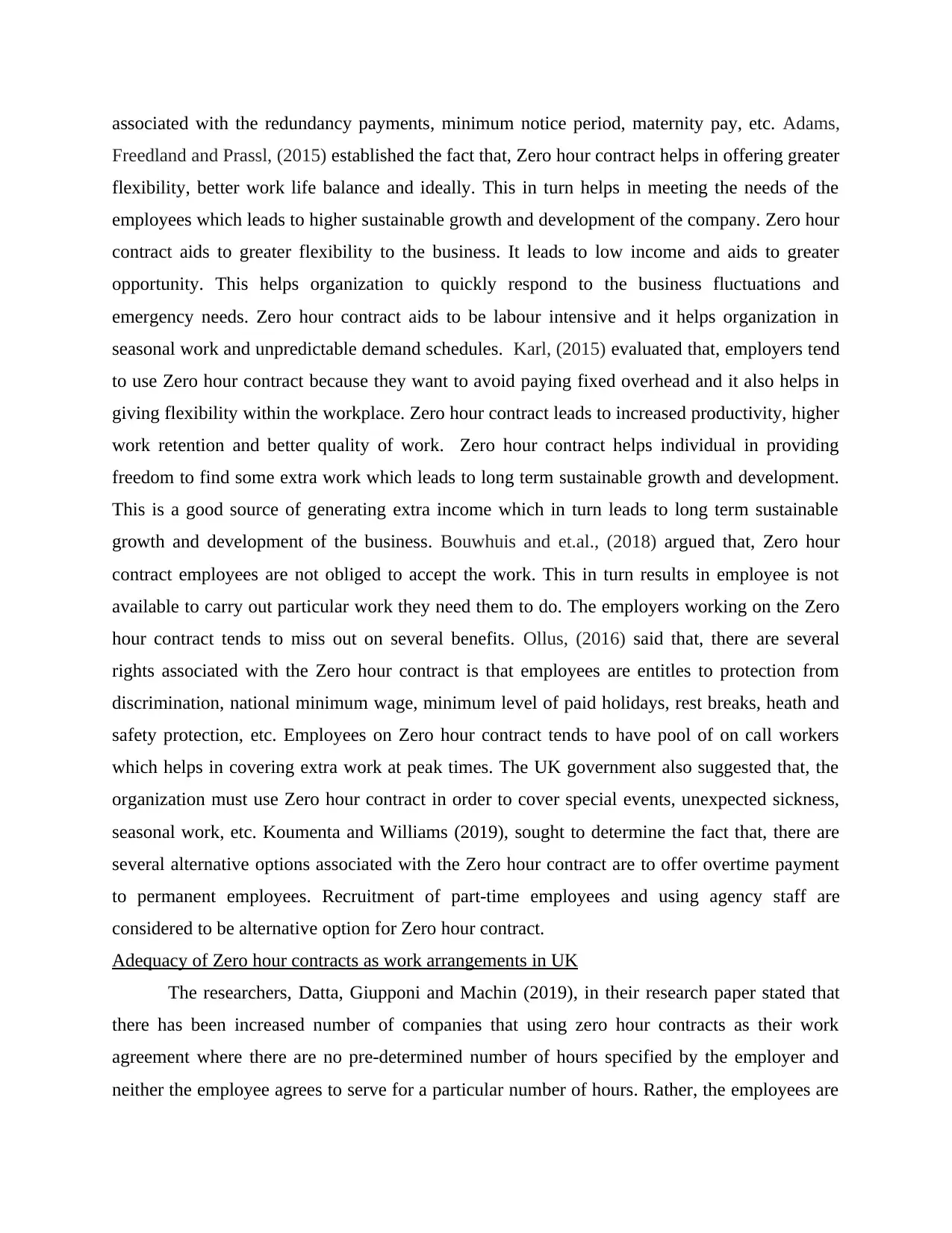
associated with the redundancy payments, minimum notice period, maternity pay, etc. Adams,
Freedland and Prassl, (2015) established the fact that, Zero hour contract helps in offering greater
flexibility, better work life balance and ideally. This in turn helps in meeting the needs of the
employees which leads to higher sustainable growth and development of the company. Zero hour
contract aids to greater flexibility to the business. It leads to low income and aids to greater
opportunity. This helps organization to quickly respond to the business fluctuations and
emergency needs. Zero hour contract aids to be labour intensive and it helps organization in
seasonal work and unpredictable demand schedules. Karl, (2015) evaluated that, employers tend
to use Zero hour contract because they want to avoid paying fixed overhead and it also helps in
giving flexibility within the workplace. Zero hour contract leads to increased productivity, higher
work retention and better quality of work. Zero hour contract helps individual in providing
freedom to find some extra work which leads to long term sustainable growth and development.
This is a good source of generating extra income which in turn leads to long term sustainable
growth and development of the business. Bouwhuis and et.al., (2018) argued that, Zero hour
contract employees are not obliged to accept the work. This in turn results in employee is not
available to carry out particular work they need them to do. The employers working on the Zero
hour contract tends to miss out on several benefits. Ollus, (2016) said that, there are several
rights associated with the Zero hour contract is that employees are entitles to protection from
discrimination, national minimum wage, minimum level of paid holidays, rest breaks, heath and
safety protection, etc. Employees on Zero hour contract tends to have pool of on call workers
which helps in covering extra work at peak times. The UK government also suggested that, the
organization must use Zero hour contract in order to cover special events, unexpected sickness,
seasonal work, etc. Koumenta and Williams (2019), sought to determine the fact that, there are
several alternative options associated with the Zero hour contract are to offer overtime payment
to permanent employees. Recruitment of part-time employees and using agency staff are
considered to be alternative option for Zero hour contract.
Adequacy of Zero hour contracts as work arrangements in UK
The researchers, Datta, Giupponi and Machin (2019), in their research paper stated that
there has been increased number of companies that using zero hour contracts as their work
agreement where there are no pre-determined number of hours specified by the employer and
neither the employee agrees to serve for a particular number of hours. Rather, the employees are
Freedland and Prassl, (2015) established the fact that, Zero hour contract helps in offering greater
flexibility, better work life balance and ideally. This in turn helps in meeting the needs of the
employees which leads to higher sustainable growth and development of the company. Zero hour
contract aids to greater flexibility to the business. It leads to low income and aids to greater
opportunity. This helps organization to quickly respond to the business fluctuations and
emergency needs. Zero hour contract aids to be labour intensive and it helps organization in
seasonal work and unpredictable demand schedules. Karl, (2015) evaluated that, employers tend
to use Zero hour contract because they want to avoid paying fixed overhead and it also helps in
giving flexibility within the workplace. Zero hour contract leads to increased productivity, higher
work retention and better quality of work. Zero hour contract helps individual in providing
freedom to find some extra work which leads to long term sustainable growth and development.
This is a good source of generating extra income which in turn leads to long term sustainable
growth and development of the business. Bouwhuis and et.al., (2018) argued that, Zero hour
contract employees are not obliged to accept the work. This in turn results in employee is not
available to carry out particular work they need them to do. The employers working on the Zero
hour contract tends to miss out on several benefits. Ollus, (2016) said that, there are several
rights associated with the Zero hour contract is that employees are entitles to protection from
discrimination, national minimum wage, minimum level of paid holidays, rest breaks, heath and
safety protection, etc. Employees on Zero hour contract tends to have pool of on call workers
which helps in covering extra work at peak times. The UK government also suggested that, the
organization must use Zero hour contract in order to cover special events, unexpected sickness,
seasonal work, etc. Koumenta and Williams (2019), sought to determine the fact that, there are
several alternative options associated with the Zero hour contract are to offer overtime payment
to permanent employees. Recruitment of part-time employees and using agency staff are
considered to be alternative option for Zero hour contract.
Adequacy of Zero hour contracts as work arrangements in UK
The researchers, Datta, Giupponi and Machin (2019), in their research paper stated that
there has been increased number of companies that using zero hour contracts as their work
agreement where there are no pre-determined number of hours specified by the employer and
neither the employee agrees to serve for a particular number of hours. Rather, the employees are
Secure Best Marks with AI Grader
Need help grading? Try our AI Grader for instant feedback on your assignments.
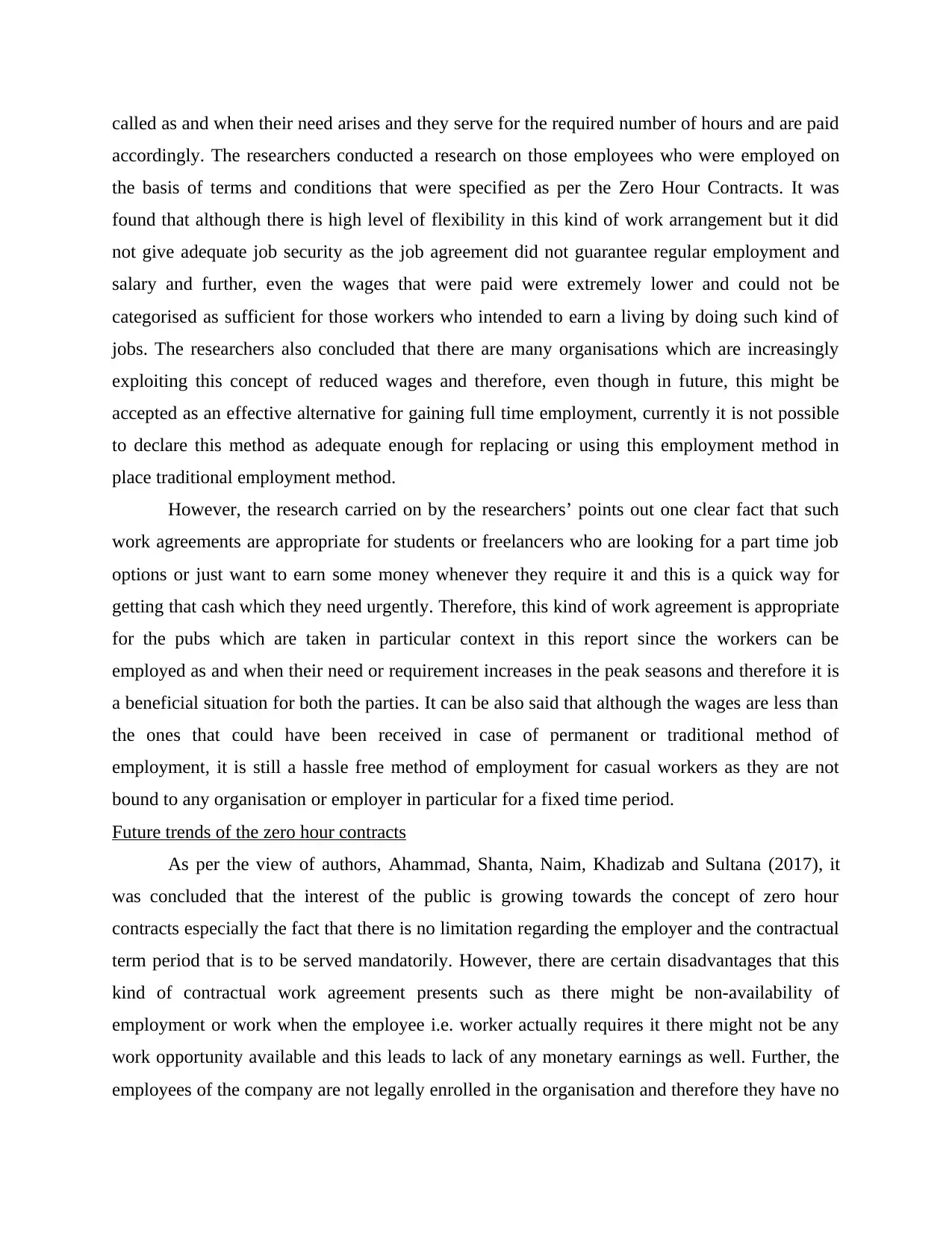
called as and when their need arises and they serve for the required number of hours and are paid
accordingly. The researchers conducted a research on those employees who were employed on
the basis of terms and conditions that were specified as per the Zero Hour Contracts. It was
found that although there is high level of flexibility in this kind of work arrangement but it did
not give adequate job security as the job agreement did not guarantee regular employment and
salary and further, even the wages that were paid were extremely lower and could not be
categorised as sufficient for those workers who intended to earn a living by doing such kind of
jobs. The researchers also concluded that there are many organisations which are increasingly
exploiting this concept of reduced wages and therefore, even though in future, this might be
accepted as an effective alternative for gaining full time employment, currently it is not possible
to declare this method as adequate enough for replacing or using this employment method in
place traditional employment method.
However, the research carried on by the researchers’ points out one clear fact that such
work agreements are appropriate for students or freelancers who are looking for a part time job
options or just want to earn some money whenever they require it and this is a quick way for
getting that cash which they need urgently. Therefore, this kind of work agreement is appropriate
for the pubs which are taken in particular context in this report since the workers can be
employed as and when their need or requirement increases in the peak seasons and therefore it is
a beneficial situation for both the parties. It can be also said that although the wages are less than
the ones that could have been received in case of permanent or traditional method of
employment, it is still a hassle free method of employment for casual workers as they are not
bound to any organisation or employer in particular for a fixed time period.
Future trends of the zero hour contracts
As per the view of authors, Ahammad, Shanta, Naim, Khadizab and Sultana (2017), it
was concluded that the interest of the public is growing towards the concept of zero hour
contracts especially the fact that there is no limitation regarding the employer and the contractual
term period that is to be served mandatorily. However, there are certain disadvantages that this
kind of contractual work agreement presents such as there might be non-availability of
employment or work when the employee i.e. worker actually requires it there might not be any
work opportunity available and this leads to lack of any monetary earnings as well. Further, the
employees of the company are not legally enrolled in the organisation and therefore they have no
accordingly. The researchers conducted a research on those employees who were employed on
the basis of terms and conditions that were specified as per the Zero Hour Contracts. It was
found that although there is high level of flexibility in this kind of work arrangement but it did
not give adequate job security as the job agreement did not guarantee regular employment and
salary and further, even the wages that were paid were extremely lower and could not be
categorised as sufficient for those workers who intended to earn a living by doing such kind of
jobs. The researchers also concluded that there are many organisations which are increasingly
exploiting this concept of reduced wages and therefore, even though in future, this might be
accepted as an effective alternative for gaining full time employment, currently it is not possible
to declare this method as adequate enough for replacing or using this employment method in
place traditional employment method.
However, the research carried on by the researchers’ points out one clear fact that such
work agreements are appropriate for students or freelancers who are looking for a part time job
options or just want to earn some money whenever they require it and this is a quick way for
getting that cash which they need urgently. Therefore, this kind of work agreement is appropriate
for the pubs which are taken in particular context in this report since the workers can be
employed as and when their need or requirement increases in the peak seasons and therefore it is
a beneficial situation for both the parties. It can be also said that although the wages are less than
the ones that could have been received in case of permanent or traditional method of
employment, it is still a hassle free method of employment for casual workers as they are not
bound to any organisation or employer in particular for a fixed time period.
Future trends of the zero hour contracts
As per the view of authors, Ahammad, Shanta, Naim, Khadizab and Sultana (2017), it
was concluded that the interest of the public is growing towards the concept of zero hour
contracts especially the fact that there is no limitation regarding the employer and the contractual
term period that is to be served mandatorily. However, there are certain disadvantages that this
kind of contractual work agreement presents such as there might be non-availability of
employment or work when the employee i.e. worker actually requires it there might not be any
work opportunity available and this leads to lack of any monetary earnings as well. Further, the
employees of the company are not legally enrolled in the organisation and therefore they have no
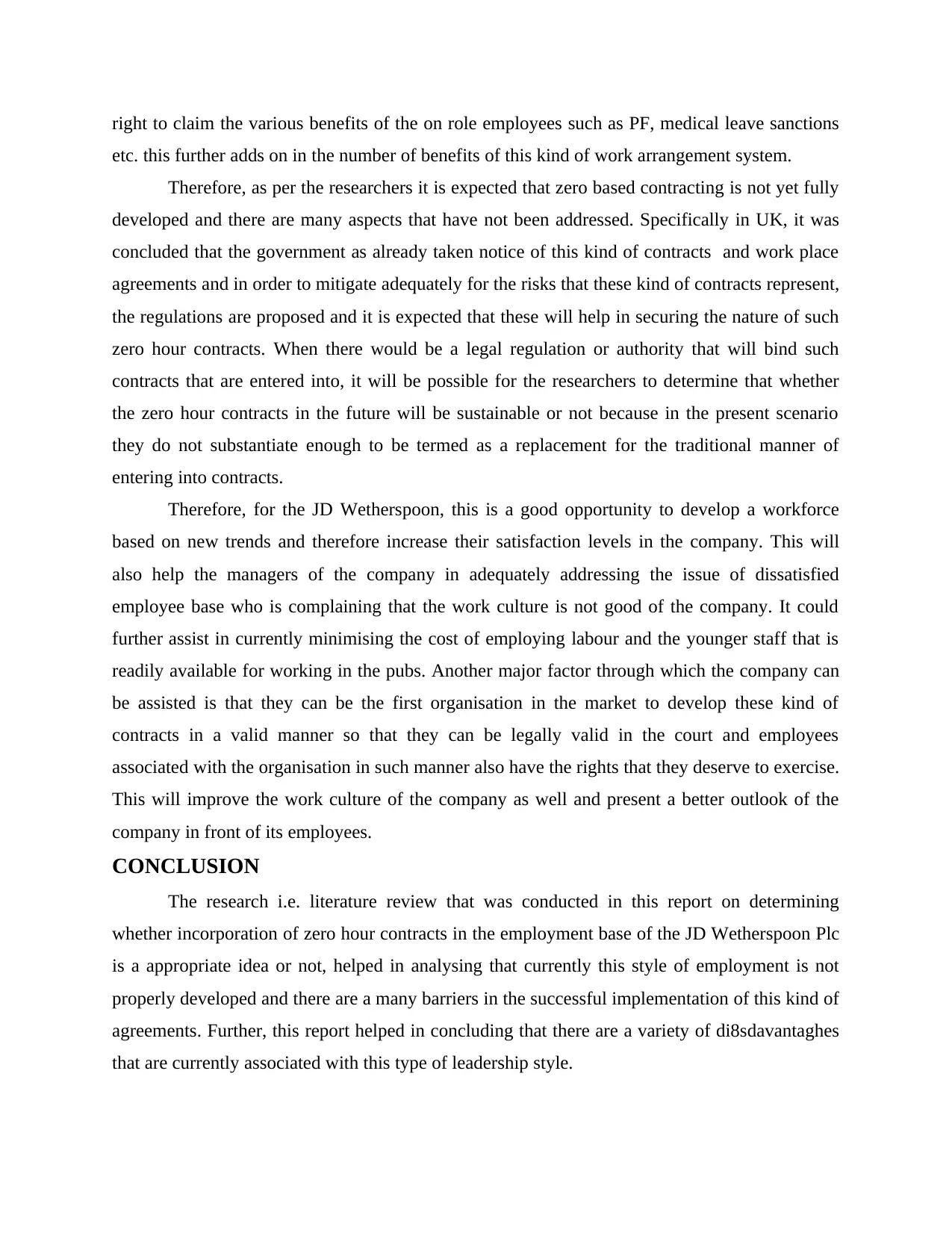
right to claim the various benefits of the on role employees such as PF, medical leave sanctions
etc. this further adds on in the number of benefits of this kind of work arrangement system.
Therefore, as per the researchers it is expected that zero based contracting is not yet fully
developed and there are many aspects that have not been addressed. Specifically in UK, it was
concluded that the government as already taken notice of this kind of contracts and work place
agreements and in order to mitigate adequately for the risks that these kind of contracts represent,
the regulations are proposed and it is expected that these will help in securing the nature of such
zero hour contracts. When there would be a legal regulation or authority that will bind such
contracts that are entered into, it will be possible for the researchers to determine that whether
the zero hour contracts in the future will be sustainable or not because in the present scenario
they do not substantiate enough to be termed as a replacement for the traditional manner of
entering into contracts.
Therefore, for the JD Wetherspoon, this is a good opportunity to develop a workforce
based on new trends and therefore increase their satisfaction levels in the company. This will
also help the managers of the company in adequately addressing the issue of dissatisfied
employee base who is complaining that the work culture is not good of the company. It could
further assist in currently minimising the cost of employing labour and the younger staff that is
readily available for working in the pubs. Another major factor through which the company can
be assisted is that they can be the first organisation in the market to develop these kind of
contracts in a valid manner so that they can be legally valid in the court and employees
associated with the organisation in such manner also have the rights that they deserve to exercise.
This will improve the work culture of the company as well and present a better outlook of the
company in front of its employees.
CONCLUSION
The research i.e. literature review that was conducted in this report on determining
whether incorporation of zero hour contracts in the employment base of the JD Wetherspoon Plc
is a appropriate idea or not, helped in analysing that currently this style of employment is not
properly developed and there are a many barriers in the successful implementation of this kind of
agreements. Further, this report helped in concluding that there are a variety of di8sdavantaghes
that are currently associated with this type of leadership style.
etc. this further adds on in the number of benefits of this kind of work arrangement system.
Therefore, as per the researchers it is expected that zero based contracting is not yet fully
developed and there are many aspects that have not been addressed. Specifically in UK, it was
concluded that the government as already taken notice of this kind of contracts and work place
agreements and in order to mitigate adequately for the risks that these kind of contracts represent,
the regulations are proposed and it is expected that these will help in securing the nature of such
zero hour contracts. When there would be a legal regulation or authority that will bind such
contracts that are entered into, it will be possible for the researchers to determine that whether
the zero hour contracts in the future will be sustainable or not because in the present scenario
they do not substantiate enough to be termed as a replacement for the traditional manner of
entering into contracts.
Therefore, for the JD Wetherspoon, this is a good opportunity to develop a workforce
based on new trends and therefore increase their satisfaction levels in the company. This will
also help the managers of the company in adequately addressing the issue of dissatisfied
employee base who is complaining that the work culture is not good of the company. It could
further assist in currently minimising the cost of employing labour and the younger staff that is
readily available for working in the pubs. Another major factor through which the company can
be assisted is that they can be the first organisation in the market to develop these kind of
contracts in a valid manner so that they can be legally valid in the court and employees
associated with the organisation in such manner also have the rights that they deserve to exercise.
This will improve the work culture of the company as well and present a better outlook of the
company in front of its employees.
CONCLUSION
The research i.e. literature review that was conducted in this report on determining
whether incorporation of zero hour contracts in the employment base of the JD Wetherspoon Plc
is a appropriate idea or not, helped in analysing that currently this style of employment is not
properly developed and there are a many barriers in the successful implementation of this kind of
agreements. Further, this report helped in concluding that there are a variety of di8sdavantaghes
that are currently associated with this type of leadership style.
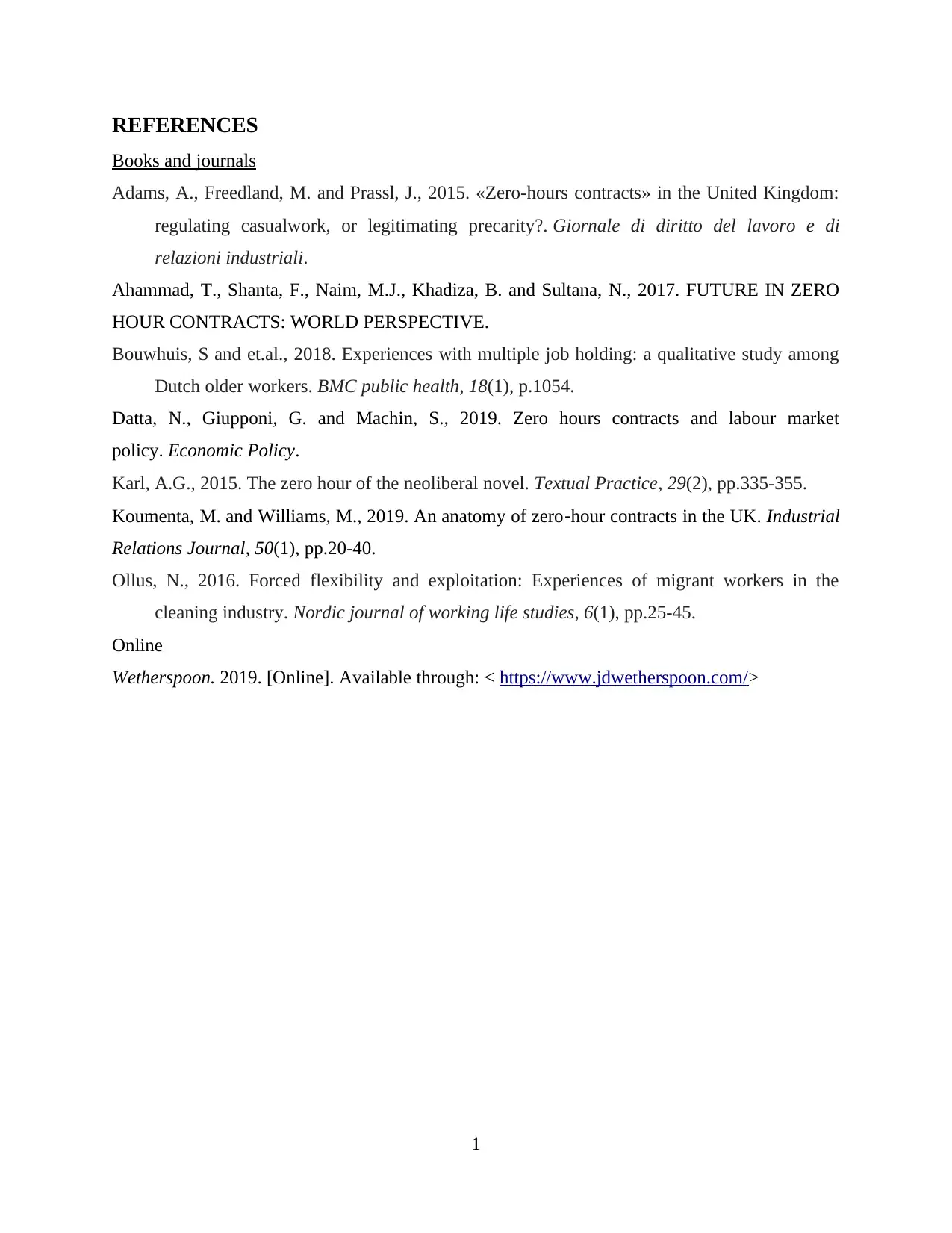
REFERENCES
Books and journals
Adams, A., Freedland, M. and Prassl, J., 2015. «Zero-hours contracts» in the United Kingdom:
regulating casualwork, or legitimating precarity?. Giornale di diritto del lavoro e di
relazioni industriali.
Ahammad, T., Shanta, F., Naim, M.J., Khadiza, B. and Sultana, N., 2017. FUTURE IN ZERO
HOUR CONTRACTS: WORLD PERSPECTIVE.
Bouwhuis, S and et.al., 2018. Experiences with multiple job holding: a qualitative study among
Dutch older workers. BMC public health, 18(1), p.1054.
Datta, N., Giupponi, G. and Machin, S., 2019. Zero hours contracts and labour market
policy. Economic Policy.
Karl, A.G., 2015. The zero hour of the neoliberal novel. Textual Practice, 29(2), pp.335-355.
Koumenta, M. and Williams, M., 2019. An anatomy of zero‐hour contracts in the UK. Industrial
Relations Journal, 50(1), pp.20-40.
Ollus, N., 2016. Forced flexibility and exploitation: Experiences of migrant workers in the
cleaning industry. Nordic journal of working life studies, 6(1), pp.25-45.
Online
Wetherspoon. 2019. [Online]. Available through: < https://www.jdwetherspoon.com/>
1
Books and journals
Adams, A., Freedland, M. and Prassl, J., 2015. «Zero-hours contracts» in the United Kingdom:
regulating casualwork, or legitimating precarity?. Giornale di diritto del lavoro e di
relazioni industriali.
Ahammad, T., Shanta, F., Naim, M.J., Khadiza, B. and Sultana, N., 2017. FUTURE IN ZERO
HOUR CONTRACTS: WORLD PERSPECTIVE.
Bouwhuis, S and et.al., 2018. Experiences with multiple job holding: a qualitative study among
Dutch older workers. BMC public health, 18(1), p.1054.
Datta, N., Giupponi, G. and Machin, S., 2019. Zero hours contracts and labour market
policy. Economic Policy.
Karl, A.G., 2015. The zero hour of the neoliberal novel. Textual Practice, 29(2), pp.335-355.
Koumenta, M. and Williams, M., 2019. An anatomy of zero‐hour contracts in the UK. Industrial
Relations Journal, 50(1), pp.20-40.
Ollus, N., 2016. Forced flexibility and exploitation: Experiences of migrant workers in the
cleaning industry. Nordic journal of working life studies, 6(1), pp.25-45.
Online
Wetherspoon. 2019. [Online]. Available through: < https://www.jdwetherspoon.com/>
1
Paraphrase This Document
Need a fresh take? Get an instant paraphrase of this document with our AI Paraphraser

2
1 out of 8
Related Documents
Your All-in-One AI-Powered Toolkit for Academic Success.
+13062052269
info@desklib.com
Available 24*7 on WhatsApp / Email
![[object Object]](/_next/static/media/star-bottom.7253800d.svg)
Unlock your academic potential
© 2024 | Zucol Services PVT LTD | All rights reserved.





